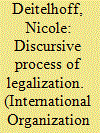|
|
|
Sort Order |
|
|
|
Items / Page
|
|
|
|
|
|
|
| Srl | Item |
| 1 |
ID:
090369


|
|
|
|
|
| Publication |
2009.
|
| Summary/Abstract |
For many political observers the successful creation of the International Criminal Court (ICC) came as a surprise, as major powers, in particular the United States, had opposed the plans for the ICC. Moreover, the institutional design of the ICC entails enormous sovereignty costs for states but only uncertain benefits. An analysis of the negotiations suggests that the court's successful creation can be attributed to persuasion and discourse within negotiations, that is, a shift in states' interests. The article develops a theoretical model of institutional change that defines the conditions under which persuasion and discourse can affect collective decision making. In particular, this study attempts to show that if (traditionally) weaker actors alter normative and institutional settings of negotiations they can further the chance of persuasion and discourse.
|
|
|
|
|
|
|
|
|
|
|
|
|
|
|
|
| 2 |
ID:
133775


|
|
|
|
|
| Publication |
2014.
|
| Summary/Abstract |
Because autocrats can rarely be voted out of power, most find themselves exiting office in far less conventional ways. Since the 1950s, the coup d'état-or the illegal seizure of power by the military-has been by far the most common.1 During the 1960s and '70s, for example, about half of all autocrats who lost power did so through a coup. But fast-forward to the 2010s, and a different picture is emerging. The chain of protests during the Arab Awakening, which toppled four of the world's longest-standing rulers-Zine al-Abidine Ben Ali of Tunisia, Hosni Mubarak of Egypt, Muammar Qaddafi of Libya, and Ali Abdullah Saleh of Yemen-led many political observers to rejoice in the masses' ability to unseat autocratic strongmen. But are these revolts evidence that autocrats are becoming increasingly vulnerable to the masses? Or are they short-term exceptions to a longer-standing rule of autocratic ouster?
|
|
|
|
|
|
|
|
|
|
|
|
|
|
|
|
| 3 |
ID:
117577


|
|
|
|
|
| Publication |
2012.
|
| Summary/Abstract |
Political observers have detected a noticeable uptick in American political incivility in recent years, culminating with several moderate senators recently citing the rise of hard-core partisanship as the reason for their retirement. Supporting these accusations of unprecedented incivility with empirical evidence can be difficult, as notions of what constitutes appropriate, civil behavior are subjective and can vary across the political context of different eras. Was it more uncivil, for example, for William Jennings Bryan to accuse his political opponents of crucifying other Americans on a cross of gold than it was for a member of Congress to yell "You lie!" at the president in the nation's Capitol? Assessing the incivility of these statements requires determining the effect each had on political opponents' abilities to maintain a functional relationship despite their disagreement over policy outcomes. Nevertheless, many politicians, political observers, and scholars are truly concerned that current levels of incivility are indeed worse, not only damaging the ability to resolve complex public problems, but threatening the long-term stability of America's governing institutions. Largely focusing on changes in institutional structures and elite behavior, scholars identify numerous explanations for this trend.
|
|
|
|
|
|
|
|
|
|
|
|
|
|
|
|
| 4 |
ID:
132164


|
|
|
|
|
| Publication |
2014.
|
| Summary/Abstract |
When Kim Il Sung, North Korea's founding ruler, died in 1994, many outside observers predicted that his state would die with him. That never happened, of course, and his son Kim Jong Il managed to keep the regime alive until his own death, in 2011. When his son Kim Jong Un took the reins that year, numerous Korea watchers again predicted a collapse. Once again, they were proved wrong. Despite its extreme poverty, North Korea is still very much alive and a major threat to its southern neighbor.
|
|
|
|
|
|
|
|
|
|
|
|
|
|
|
|
|
|
|
|
|